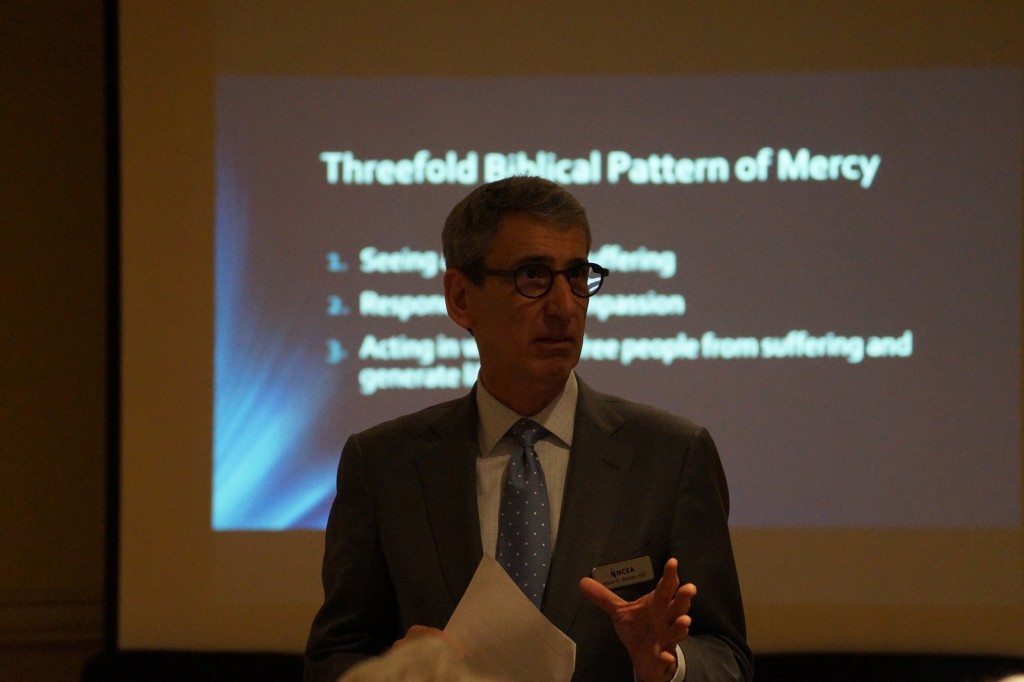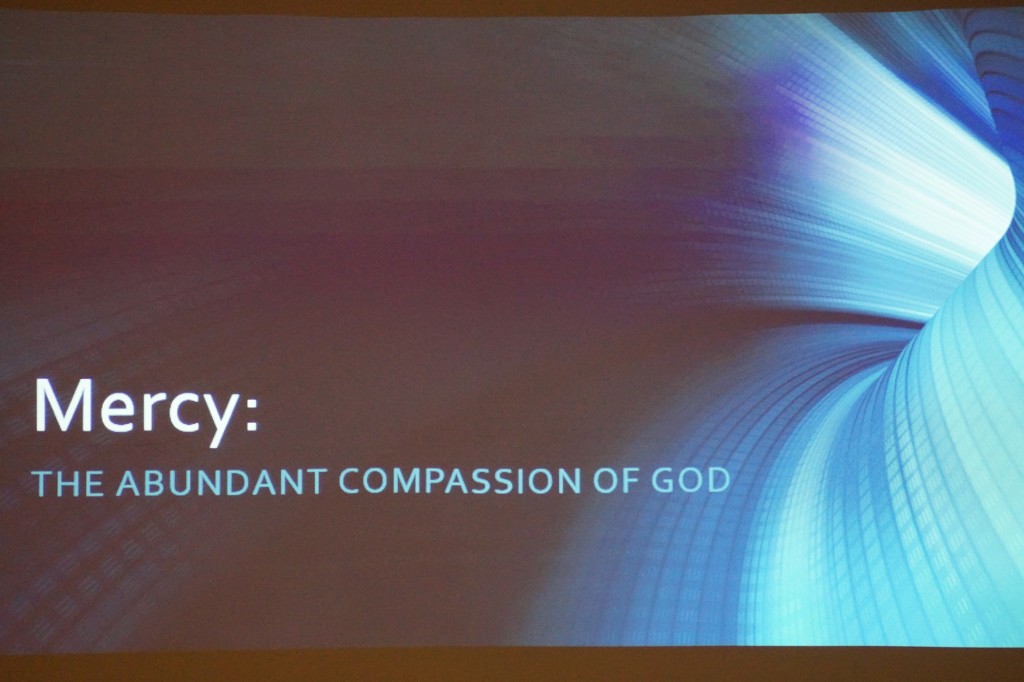Francis has proclaimed an Extraordinary Jubilee Year of Mercy beginning December 8, 2015 extending to November 20, 2016, the Feast of Christ the King. From the beginning of his papacy, the Holy Father has focused much of his writing and preaching on the Church’s mission to proclaim and practice compassion and mercy: “The Church’s very credibility is seen in how she shows merciful and compassionate love.”
In his NCEA 2015 Catholic Leadership Summit presentation, “A Reflection on the Year of Mercy,” NCEA President Robert Bimonte, FSC examined the biblical understanding of mercy and engaged participants in discussion of how we as leaders practice and teach mercy.
Dubbing it a new “favorite quote,” Brother Robert shared the words of Hugh Kerr: “All wisdom is plagiarism; only stupidity is original.” With this mind, Brother Robert and attendees “plagiarized” the wisdom of Pope Francis, the wisdom of the Old and New Testaments and the wisdom of experience to guide them in the understanding biblical concept of mercy.
We need constantly to contemplate the mystery of mercy. It is a wellspring of joy, serenity, and peace. Our salvation depends on it. Mercy: the word reveals the very mystery of the Most Holy Trinity. Mercy: the ultimate and supreme act by which God comes to meet us. Mercy: the fundamental law that dwells in the heart of every person who looks sincerely into the eyes of his brothers and sisters on the path of life. Mercy: the bridge that connects God and man, opening our hearts to the hope of being loved forever despite our sinfulness.
At times we are called to gaze even more attentively on mercy so that we may become a more effective sign of the Father’s action in our lives. For this reason I have proclaimed an Extraordinary Jubilee of Mercy as a special time for the Church, a time when the witness of believers might grow stronger and more effective.” – Pope Francis, An excerpt from the Bull of Indication of the Extraordinary Jubilee of Mercy
The Bible is our story of God’s love and mercy. Good IS love – God IS mercy – God IS Forgiveness. They are not just attributes; they are the essence of divinity. Exploring the word “Rahamim” as “compassion,” it was noted it that it appears in Hebrew scripture 81 times to describe God. Turning to the New Testament, Jesus tells us that Love, Mercy, Compassion and Forgiveness are the very essence of God and Jesus makes them the criteria for discipleship. We are called to be merciful as God is merciful.
Brother Robert continued to remind the attendees that God sees the Christ in us – not the sin or the negative. “Imagine how differently we would treat one another if we reminded ourselves to do this.” As an example, Brother Robert refers to his interactions Sister Helen Prejean, who works closely with those who have committed crime and how she sees the light and the goodness only in her interactions with those she meets. Upon closing curtain of the opera rendition of “Dead Man Walking,” Brother turned and asked her, “What is on your mind?” She responded simply, “You are not watching me on that stage, you are watching the Gospel.” Again, we are called to be merciful as God is merciful.
There is a threefold biblical pattern of mercy as established in Exodus and repeated in the New Testament:
- Seeing and hearing suffering: There is a big difference between observing and really seeing. We observe the struggles on the news, but do we really see them? When we observe a homeless person, do we really see the situation?
- Responding with Compassion: Do we truly understand what we are facing?
- Acting in ways that free people from suffering and generate life: How are we called to act with mercy?
Attendees of the session then explored scripture by reflecting and discussing The Parable of the Good Samaritan (Luke 10:25-37), The Story of the Woman who was Bent Over (Luke 13: 11-17) The Parable of the Lost Son (Luke 15:11-32) to find the pattern of mercy.
Upon reflection of The Good Samaritan: “This is what I believe Pope Francis is saying. Open your eyes. Open your ears. THIS is the call of the Year of Mercy,” Brother Robert stressed. “Do something. Do something. Do something. Because any one of is not enough, we need to have all three parts of the pattern of mercy.”
In the woman who was bent over, we are challenged to think to see like Jesus. To see this biblical understanding we need to build a spirituality of attentiveness. “How often do we give people our full attention?” We are called to be fully present; it is one of the greatest gifts we can give one another.
If you cannot know the acceptance of another human being, how can you understanding the love and presence of God?
We also need to be able to convey outrage and injustice in our presence. We have to feel guilty for not giving action in the face of injustice. Simultaneously, we need to practice forgiveness and reconciliation.
This idea is explored in the Parable of the Lost Son. The parable proves to be difficult upon reflection as one considers the balance of what is fair and what is equal. We must understand the difference between compassion as transactional versus transformational.
Mercy, therefore is the invitation to wholeness.
The session concluded with independent reflection and participant discussion about how we have practiced mercy, or, in turn, how we can move forward in practicing mercy.
Brother Robert acknowledged the challenge we face in acting merciful. We must see beyond disease, gender or orientation. We must see the Christ among us. To confront evil like Jesus, we must name it. The Gospel calls us to be examples of contradiction. “Love your enemy.” “The last shall be first.” This is not the way of the world. But this is the way of mercy.

